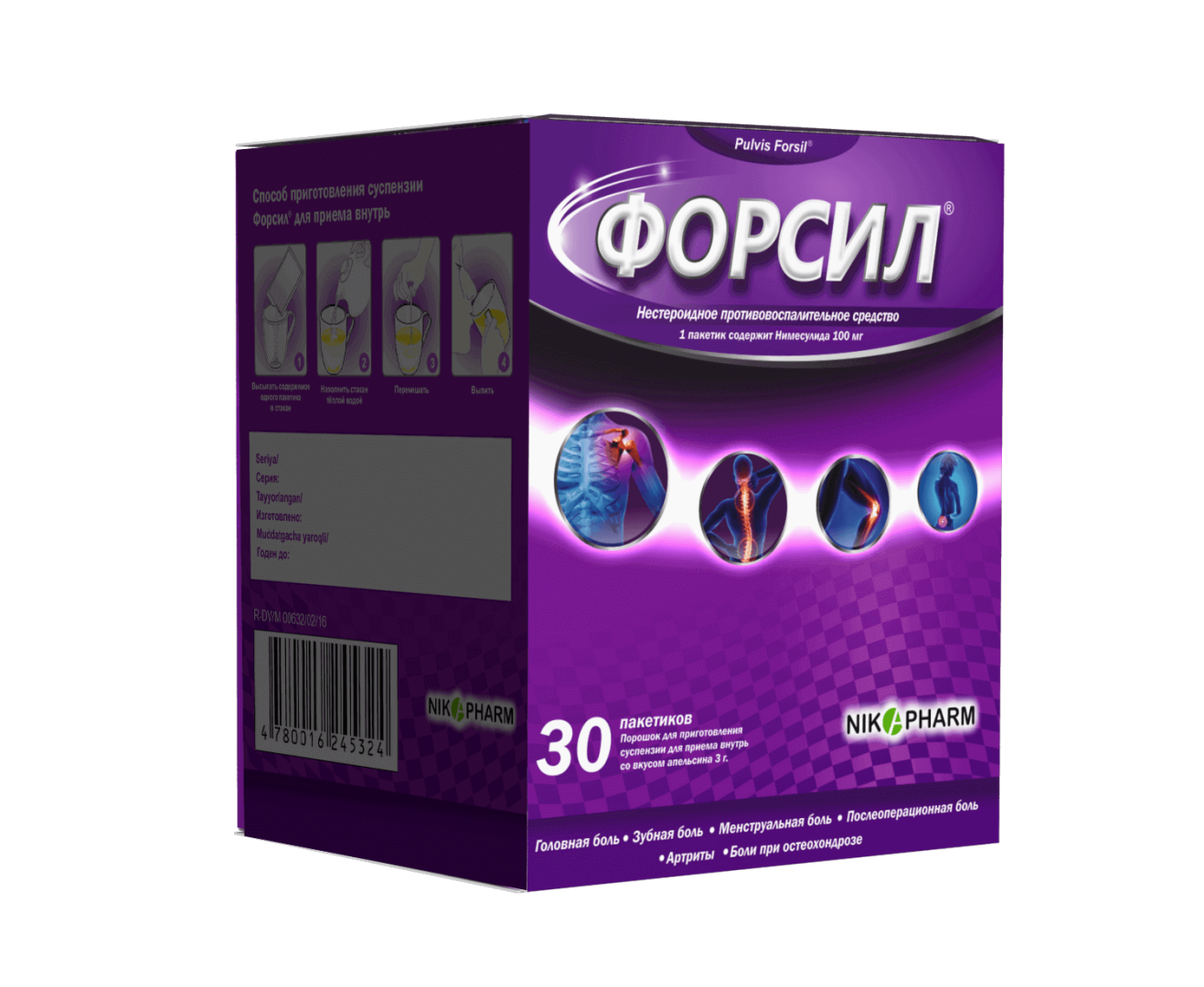
In addition, ibuprofen is indicated for the treatment of non-rheumatic inflammatory processes of the periarticular tissues, such as "frozen shoulder" (inflammation of the joint lining), bursitis, tendinitis, tendovaginitis and low back pain; to relieve pain syndrome due to muscle and ligament damage. Ibuprofen is often prescribed to relieve pain due to dysmenorrhea, dental, headache or postoperative pain.
The simultaneous use of ibuprofen with the following drugs should be avoided:
Acetylsalicylic acid (aspirin).
Concomitant therapy with ibuprofen and acetylsalicylic acid is generally not recommended, so as not to aggravate possible side effects (except for doses up to 75 mg / day). In case of combined therapy, there is a high risk that ibuprofen will competitively inhibit the effect of low-dose acetylsalicylic acid on platelet aggregation.
Corticosteroids.
The risk of gastrointestinal ulcers and gastrointestinal bleeding increases.
Antiplatelet drugs and some selective serotonin reuptake inhibitors (SSRIs).
The risk of gastrointestinal bleeding also increases.
Antihypertensive and diuretic drugs.
Ibuprofen and NSAIDs in general can reduce the effectiveness of drugs in these groups.
Anticoagulants. NSAIDs can enhance the effect of drugs that reduce blood clotting, such as warfarin. When prescribed simultaneously with anticoagulant and thrombolytic drugs, the risk of bleeding increases.
Cardiac glycosides.
When taken simultaneously, NSAIDs may worsen heart failure, cause a decrease in the glomerular filtration rate, and increase the concentration of glycosides in the blood plasma.
Lithium.
There is evidence that NSAIDs can potentially cause an increase in the concentration of lithium in the blood plasma.
Methotrexate.
There is evidence that NSAIDs can potentially cause an increase in the concentration of methotrexate in the blood plasma.
Cyclosporin.
Increased risk of nephrotoxicity.
Mifepristone.
NSAIDs should not be used for 8-12 days after taking mifepristone, since NSAIDs can reduce the effect of mifepristone.
Tacrolimus.
When taking NSAIDs and tacrolimus simultaneously, the risk of nephrotoxicity may increase.
Zidovudine.
Concomitant use of NSAIDs and zidovudine may increase hematotoxicity. There is evidence of an increased risk of hemarthrosis and hematomas in HIV-positive patients with hemophilia who received concomitant treatment with zidovudine and ibuprofen.
Quinolone antibiotics.
Animal studies have shown that NSAIDs may increase the risk of seizures associated with quinolone antibiotics. Patients taking NSAIDs and quinolones concomitantly are at increased risk of seizures.
Cyclosporine and gold preparations.
Enhance the effect of ibuprofen on prostaglandin synthesis in the kidneys, which increases the risk of nephrotoxicity. Ibuprofen increases the plasma concentration of cyclosporine and the likelihood of its hepatotoxic effects.
Oral antidiabetic agents.
Ibuprofen enhances the effect of oral hypoglycemic drugs, sulfonylureas and insulin, which may increase the risk of hypoglycemia. Given all of the above, a course of ibuprofen medications is prescribed by a doctor after a thorough examination of the patient's medical history and with further monitoring of his condition.
NIMESULIDE
Nimesulide is a non-steroidal anti-inflammatory drug that has analgesic, anti-inflammatory and antipyretic properties. Nimesulide is used to relieve the symptoms of various conditions such as osteoarthritis, rheumatoid arthritis, myalgia, headache, toothache, menstrual pain and other types of pain. It can also be used to reduce temperature during fever.
Thus, nimesulide causes fewer side effects from the gastrointestinal tract. This makes it most valuable for clinical practice, since the development of digestive system pathology is one of the criteria determining the risk-benefit ratio for this class of painkillers.
Nimesulide suppresses the formation of free oxygen radicals, inhibits the release of myeloperoxidase without affecting the processes of phagocytosis and chemotaxis, inhibits the formation of tumor necrosis factor and other inflammatory mediators. In addition, according to a number of studies, nimesulide has a number of pharmacological effects that are independent of the class-specific effect on COX-2. It suppresses the hyperproduction of the main proinflammatory cytokines, reduces the activity of metalloproteinases (responsible, in particular, for the destruction of the glycoprotein complex of cartilage tissue in osteoarthritis), and exhibits an antihistamine effect. Among the non-COX-2-associated effects of nimesulide, it is especially worth noting the ability to suppress the enzyme phosphodiesterase IV and thereby reduce the activity of macrophages and neutrophils, which play such an important role in the pathogenesis of acute inflammatory reactions.
Light yellow granular powder with orange odor. When the contents of 1 sachet are dissolved in 100 ml of warm water, a white suspension with a yellowish tint is formed, with an orange flavor.
nimesulid - 100 mg


